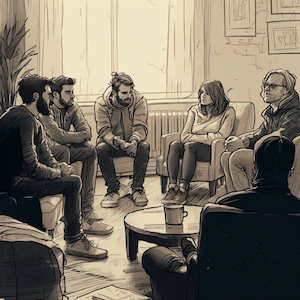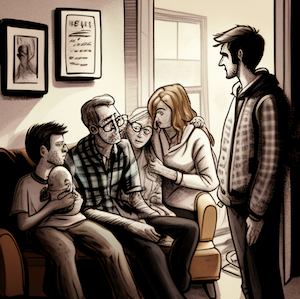
The Role of Family in Inpatient Drug Rehab
Inpatient drug rehab can be a challenging but life-changing experience for individuals struggling with addiction. It is a time when individuals can focus on their recovery and work on rebuilding their lives. However, addiction does not just affect the individual struggling with it; it also impacts their family members. Family members often play a crucial role in an individual's journey to recovery. The support, encouragement, and guidance provided by family members can make a significant difference in an individual's recovery process.
The Impact of Addiction on Families
Addiction is a disease that affects not only the individual struggling with it but also their family members. Addiction can cause significant stress, tension, and conflict within families. It can lead to financial strain, legal problems, and other difficulties that can impact the entire family.
Families often experience a range of emotions when dealing with addiction, including anger, frustration, guilt, and sadness. They may struggle to understand why their loved one is struggling with addiction and may feel helpless in their efforts to support them.

Benefits of Family Involvement in Inpatient Drug Rehab
Family involvement in inpatient drug rehab can have several benefits for both the individual struggling with addiction and their family members. Some of these benefits include:
- Increased motivation for recovery: Knowing that their loved ones are involved in their recovery process can increase an individual's motivation to stay sober and complete their treatment program.
- Improved communication: Family therapy can help improve communication between family members, leading to healthier relationships and a better understanding of each other's needs and perspectives.
- Enhanced family support: Family members can provide a significant amount of emotional support during the recovery process, which can help individuals cope with the challenges of addiction and reduce their risk of relapse.
- Identification of underlying issues: Family therapy can help identify underlying issues within the family that may have contributed to an individual's addiction, such as trauma, stress, or communication problems. Addressing these issues can help promote healing and prevent future relapse.
Incorporating Family Therapy into Inpatient Drug Rehab Programs
Incorporating family therapy into inpatient drug rehab programs can be an effective way to support both the individual struggling with addiction and their family members. Family therapy can help families work through the challenges of addiction and promote healing and recovery.
Some ways to incorporate family therapy into inpatient drug rehab programs include:
Family Education Sessions
Education sessions can help families understand addiction and learn how to support their loved ones in recovery. These sessions can also provide families with tools and strategies for managing their own emotions and supporting their loved ones through the recovery process.
Family Counseling Sessions
Family counseling sessions can help families work through the emotional challenges of addiction, improve communication, and identify and address underlying issues.
Family Visitation and Support
Inpatient drug rehab programs that allow family visitation and support can provide a supportive environment for both the individual in treatment and their family members. Visiting and supporting their loved one can help families feel more involved in the recovery process and promote healing.

Frequently Asked Questions (FAQs)
How can family members support their loved ones in recovery?
Family members can support their loved ones in recovery by providing emotional support, attending family therapy sessions, and participating in education sessions to learn more about addiction and how to support their loved ones through the recovery process. They can also help create a supportive environment at home by removing any triggers or substances that may tempt their loved one to use drugs or alcohol.
What if a family member is also struggling with addiction?
If a family member is also struggling with addiction, it is important for them to seek their own treatment and support. It can be challenging to support a loved one in recovery if you are also struggling with addiction. Seeking treatment and support for themselves can help family members better understand addiction, manage their own emotions, and provide more effective support to their loved ones in recovery.
What if a family member is not supportive of their loved one's recovery?
It is not uncommon for family members to struggle with their own emotions and feelings when dealing with addiction. If a family member is not supportive of their loved one's recovery, it can be helpful to address the issue in family therapy sessions. Family therapy can provide a safe and supportive environment for family members to work through their own emotions and develop strategies for supporting their loved one in recovery.
Inpatient drug rehab can be a challenging but life-changing experience for individuals struggling with addiction. However, the support and involvement of family members can make a significant difference in an individual's recovery process. Family involvement can provide emotional support, improve communication, identify underlying issues, and increase motivation for recovery. Incorporating family therapy into inpatient drug rehab programs can be an effective way to support both the individual struggling with addiction and their family members. It is important for families to seek support and education to better understand addiction and learn how to support their loved ones through the recovery process.
Resources
Center for Substance Abuse Treatment. Substance Abuse Treatment and Family Therapy. Rockville (MD): Substance Abuse and Mental Health Services Administration (US); 2004. (Treatment Improvement Protocol (TIP) Series, No. 39.) Chapter 2. Impact of Substance Abuse on Families. Available from: https://www.ncbi.nlm.nih.gov/books/NBK64258/
National Institute on Drug Abuse. Principles of Drug Addiction Treatment: A Research-Based Guide (Third Edition). Family Behavior Therapy. Available from: https://archives.nida.nih.gov/publications/principles-drug-addiction-treatment-research-based-guide-third-edition
Substance Abuse and Mental Health Services Administration. Incorporating Family Therapy into Substance Abuse Treatment. Treatment Improvement Protocol (TIP) Series, No. 39. Rockville (MD): Substance Abuse and Mental Health Services Administration (US); 2004. Available from: https://store.samhsa.gov/product/treating-concurrent-substance-use-among-adults/PEP21-06-02-002?referer=from_search_result
"The role of family therapy in the treatment of substance abuse: A review and synthesis of the literature" by Timothy J. Ozechowski and William R. Liddle, Journal of Marital and Family Therapy, Volume 38, Issue 1, January 2012, Pages 59-81. Available from: https://onlinelibrary.wiley.com/doi/full/10.1111/j.1752-0606.2011.00245.x










